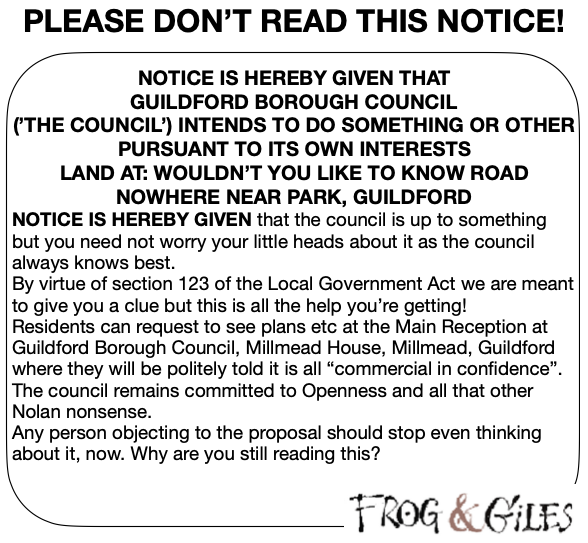 Abraham Lincoln
If given the truth, the people can be depended upon to meet any national crisis...
Abraham Lincoln
If given the truth, the people can be depended upon to meet any national crisis...
 Guildford news...
for Guildford people, brought to you by Guildford reporters - Guildford's own news service
Guildford news...
for Guildford people, brought to you by Guildford reporters - Guildford's own news service
Letter: Our Democracy, and the Vote of the Student Herd
Published on: 24 Nov, 2019
Updated on: 24 Nov, 2019
 From John Perkins
From John Perkins
I believe non-party campaigners and tactical votes are affecting our democracy.
A movement akin to “Unite to Remain” existed even in 2017, though then it might have been more accurately described as “Unite against Tories”. There was a clear indication of tactical voting in many constituencies in England and Wales.
In Northern Ireland, there was no evidence of a tactical vote. In Scotland, the solitary example was Edinburgh South.
What links those places where a herd vote appeared strongest at the last election is a large student presence. A similar effect can also be seen in constituencies listed by the Electoral Commission as at risk from postal vote fraud.
The absence of tactical voting in Northern Ireland can probably be explained by the stricter controls there and the fact that the three parties Labour, Lib Dem and Green have little support, so there is nobody for them to be herded toward. In 2017, Scotland had no non-party campaigners.
How the central and northern constituencies of Glasgow vote next month will be interesting, with Momentum now active in the city. A sudden surge to Labour, as happened in England, could see them take four seats back from the SNP.
When compared with 2015, the Green Party vote in England collapsed by about half, yet uniquely in Brighton Pavilion (32% student population), it increased by nearly a third, allowing their leader to retain her previously marginal seat with a huge majority.
Labour and Lib Dem support were both reduced. Perhaps the students there were more aware of the looming climate crisis.
In England, the Lib Dems can be thought to have benefited from a herd vote (where they gained and both Labour and Green lost support) in a dozen or so places. Only half of them resulted in seats and only one a gain but, in general, their majorities were increased and those of Conservatives decreased.
Labour were the beneficiaries of a herd vote in votes in 110 English constituencies with student electorates. As many as a further 41 may have been influenced by postal vote problems. Potentially, 102 more were influenced by both.
In total, nearly half of the 533 constituencies in England are likely to have been affected by these two issues.
While tactical voting is one of the few legitimate ways to counter the problems of a First-Past-The-Post voting system, it is fair to pose the following questions of it:
- If tactical voting is organised by a group, does that group constitute a secret or shadow party and so should it be subject to the same controls as campaigning parties? Perhaps they should even be considered as part of the campaigning party?
- To what extent is the transient student population who vote tactically disenfranchising local voters? Given that they enjoy freely available postal votes in their home towns, why should they alone have the right to choose where to vote?
Responses to Letter: Our Democracy, and the Vote of the Student Herd
Leave a Comment Cancel replyPlease see our comments policy. All comments are moderated and may take time to appear.

See Dragon story: GBC’s Explanation of Major Land Sale Notice Error ‘Borders on Arrogant’ Says Councillor




Recent Articles
- Notice: Exhibition – Ripley – World Famous Cycling Mecca
- Volunteer Organisers for the Poppy Appeal Urgently Needed
- ‘Damning’ Report Debated at Council Meeting – CEO Calls for Councillors to Come Together
- Surrey Children’s Services Improvement Recognised by Ofsted
- Independent Guildford Stationers Are ‘Top of the Shops’
- Birdwatcher’s Diary No.304
- Cyclist Dies in Peaslake
- Surviving Strategic Director Quits to Take Up CEO Role with a West Sussex Council
- Letter: Damning Reports Should Not Be Used to Gain Political Advantage
- New Leader of the Opposition at Waverley


Recent Comments
- Olly Azad on Mistreated Former Sub-postmasters Receive Standing Ovation
- Barry Jutsum on Letters, Comments, Complaints Policy and Privacy Statement
- Aubrey Leahy on Guildford Police Station to Close – Officers to Move to Mount Browne HQ
- John Ferns on Guildford Police Station to Close – Officers to Move to Mount Browne HQ
- Barry C Williams on Letter: Cross-party Effort Required to Improve Police Resourcing in Surrey
- Anthony Mallard on Guildford Police Station to Close – Officers to Move to Mount Browne HQ
Search in Site
Media Gallery
Dragon Interview: Local Artist Leaves Her Mark At One of England’s Most Historic Buildings
January 21, 2023 / No Comment / Read MoreDragon Interview: Lib Dem Planning Chair: ‘Current Policy Doesn’t Work for Local People’
January 19, 2023 / No Comment / Read MoreA3 Tunnel in Guildford ‘Necessary’ for New Homes, Says Guildford’s MP
January 10, 2023 / No Comment / Read More‘Madness’ for London Road Scheme to Go Ahead Against ‘Huge Opposition’, Says SCC Leader
January 6, 2023 / No Comment / Read MoreCouncillor’s Son Starts Campaign for More Consultation on North Street Plan
December 30, 2022 / No Comment / Read MoreCounty Council Climbs Down Over London Road Works – Further ‘Engagement’ Period Announced
December 14, 2022 / No Comment / Read MoreDragon Interview: GBC Reaction to the Government’s Expected Decision to Relax Housing Targets
December 7, 2022 / No Comment / Read MoreHow Can Our Town Centre Businesses Recover? Watch the Shop Front Debate
May 18, 2020 / No Comment / Read More






Mark Bray-Parry
November 24, 2019 at 10:44 pm
Mr Perkins shows incredible naivety in his letter. From the implication that the student vote is is significant when relative to other residents (putting aside the fact that, as residents, their vote is equally valid) to his bizarre analysis of Northern Ireland, where the reason for Lib Dem and Labour’s lack of electoral success is, at least in part, down to the fact that they don’t contest elections in Northern Ireland.
He is right about one thing though. First-past-the-post has problems. It should not necessitate me to have stood aside in Guildford to ensure that the left/Remain vote is not split against a united right/Leave vote.
Alas, here we are. I hope we can count on Mr Perkin’s support when campaigning for an electoral system that means electoral agreements and tactical voting are no longer needed.
Mark Bray-Parry withdrew as the Green Party’s Parliamentary candidate for Guildford.
John Perkins
November 25, 2019 at 1:00 pm
My complaint about student votes is that they get a choice of where to cast them while most people do not.
The comparison with Northern Ireland (and Scotland) illustrates that students did not skew the results in those countries in 2017 whereas there are strong indications that they did so in England and Wales. More than two-thirds of voters in Brighton Pavilion are not students, yet it seems the student vote counts most because it is given largely to one candidate. Nobody should believe that one particular group supports only one view of politics. Statistics show that it is not true of students too, of course.
It was not necessary for Mark Bray-Parry to stand aside; he chose to do so.* By doing that he obliged more than a thousand people to vote tactically rather for the Green Party.
I’ve written many letters in these pages suggesting that the electoral system be changed to something more suitable for the 21st century and have not changed my mind on the matter. Tactical voting is a symptom of the failure of FPTP.
Editor’s note: * He chose to follow his party’s direction.
Michael Aaronson
November 25, 2019 at 1:50 pm
I wonder why Mr Perkins thinks it is appropriate to use the word “herd” with regard to the student vote? As he himself acknowledges in his response to Mr Bray-Parry, students’ political views are as diverse as those of any other sector of the voting population.
We should value their interest in politics, and do all we can to encourage them to engage. Giving them the option of voting at home or at their university is surely designed to facilitate that; if at relatively short notice they had to apply for a postal vote might it not put them off altogether?
At any rate, we are all agreed that FPTP is no longer fit for purpose and needs to be abandoned as soon as possible if we are to have a more representative politics in our increasingly diverse society. The traditional arguments against proportional representation no longer apply when the priority should be to oblige politicians to seek compromise rather than hunker down in their polarised and entrenched positions.
John Williams
November 25, 2019 at 7:41 pm
It is an insult to students and younger people to categorise them as a herd in the way they may vote in the general election.
They are the future generations and may well now have different views to older people. They are perfectly entitled to vote how they want. They are not a herd of cattle.
Right-wing hard Brexiteers now have no choice in many constituencies. Nigel Farage removed over 300 Brexit Party candidates. All 635 Conservative candidates have to follow the Party line.
The Unite to Leave alliance looks like a flock of sheep to me.